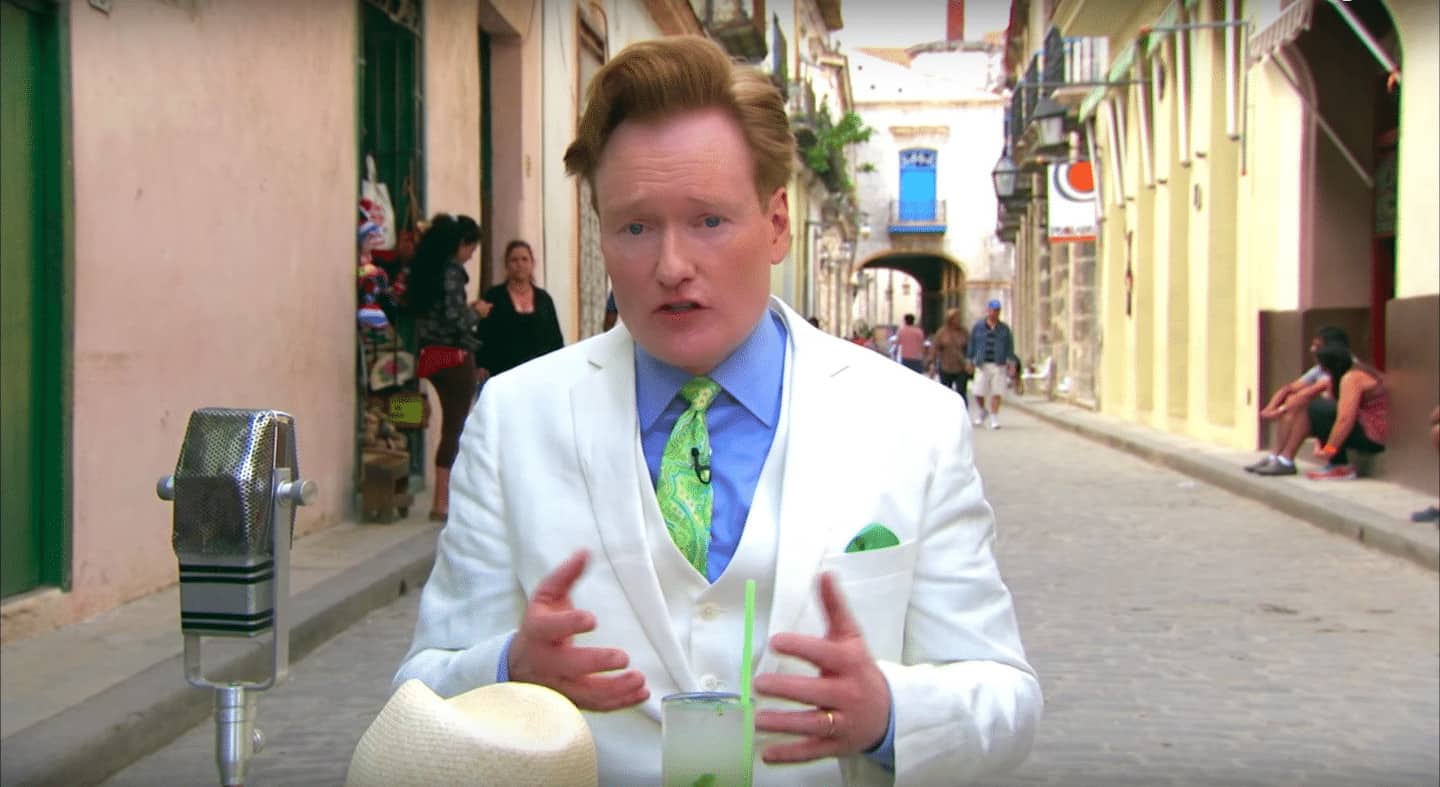
With Conan O’Brien’s special in Haiti on its way, we consider the cultural issues surrounding his travel segments.
In light of President Trump’s recent comments calling the continent of Africa and Haiti “shithole countries,” Conan O’Brien announced that he would be traveling to Haiti to shoot a remote segment for his show. This was another in a pattern of remotes as responses to politically charged events, including one in Mexico as a response to Trump’s desire to “build a wall” and another in Cuba after the United States lifted their embargo. In these segments, O’Brien engages with each country’s national history and interacts with locals to comedic effect. However, it’s important to consider what the impact of these specials are beyond their use as comedy and entertainment.
The remotes in the show never feel offensive because O’Brien positions himself as the butt of every joke. His appearance helps; being a lanky 6’4” Irish-American who is all limbs and red hair, O’Brien looks out of place almost everywhere. In this vein, the joke is always O’Brien’s lack of understanding of the cultural idiosyncrasies, as an outsider, not on the culture or the peoples themselves. In segments in his office, O’Brien relentlessly bullies his staff on camera — but their stifled laughter alerts the audience that they’re all in on the joke. Abroad, O’Brien tailors his humor to be more self-deprecating: locals are the ones who get to make fun of O’Brien for being too tall, too pale, too American, too weird. This deference is what makes his comedy palatable: as O’Brien has said himself, “I think when I behave like an idiot, it’s a universal language”.
Further, in some segments O’Brien abides by the “rules” responsible tourists already know: always ask for permission and get out of the way when necessary. When the comedian travels with friends or coworkers who are from the country he visits (such as actor Steven Yeun in South Korea and comedian Flula Borg in Germany), they serve as intermediaries and set boundaries accordingly, showing the country on their terms. This also benefits his comedy, as O’Brien can play off them for laughs.
This is in stark contrast to Karl Pilkington’s show An Idiot Abroad, where the humor stems from the host’s utter reluctance to engage in any activities whatsoever. The show purports to be anti-discrimination because Pilkington hates everything from all countries — but the joke falls slightly flat. When entertainers lack the understanding of the power dynamics of their craft, situations can turn from comedic to insensitive. As a wealthy, white Brit, Pilkington’s national history is one of colonization and cultural imperialism, so a reluctance to engage with global tradition feels less like boredom and more an unpleasant reenactment of cultural suppression. Similarly, when Jimmy Kimmel hosted last year’s Oscars, he ignorantly brought in a group of tourists to ogle at the celebrities present. Critics viewed this as a bizarre menagerie of the lower and middle classes being presented as entertainment for a group of Hollywood elites–they were laughing at the tourists, not with them. To O’Brien’s credit, he battles similar unequal power dynamics with the appropriate respectfulness of a tourist with a genuine enthusiasm to learn.
Even as a comedy, however, the show still struggles to disentangle its good-natured humor from its abundantly political overtones. When he traveled to Cuba, it was ostensibly to show Americans the beauty of Cuban culture and the country’s people. But the visit was still prompted by a lifting of the American embargo: a destabilization tactic that lasted for over a century. In other words, the special was only filmed as a response to political events. The political nature of these trips was made even more overt by O’Brien himself in his Israel episode, where he joked, “due to all the division and strife and intractable hatred and division in this country right now, I’ve decided to leave America for the relative peace, sanity, and quiet of the Middle East.” In Israel, O’Brien participated in comedic segments with members of the Israel Defence Forces (as well as a brief sketch with an ex-IDF member, actress Gal Gadot), and even one with President Benjamin Netanyahu. In more sobering segments, O’Brien spoke with Palestinian activists and people in refugee camps in the West Bank. Accordingly, the entire trip riled up forceful reactions from news outlets, both in Israel and Palestine and online. Even as a comedian, the politics of the specials made distancing O’Brien from critique impossible.
This inherent problematization does not mean that O’Brien can’t or shouldn’t continue filming similar segments abroad. In one of his most moving segments, O’Brien visits the Armenian Genocide Memorial with his assistant, Sona Movsesian. In it, the comedian asks only sporadic questions about her family, giving Movsesian the time to speak about a tragedy that has profoundly impacted her livelihood and her family. It’s a poignant, sobering moment that educates and demonstrates the importance of the show’s work.
Ultimately, no matter how noble of intent or empathetic these specials are, there is always an element of opportunism, as he generates content by using culture and people as props to further his comedy. It is, of course, impossible to fully encapsulate the nuances of any lived experience in an hour-long television special. O’Brien himself doesn’t claim that the segments are all-encompassing, and he’s not singlehandedly responsible for introducing all of the world’s beauty and ills to Americans. However, it still stands that no matter how comedic its nature, the show is clearly not devoid of politics. What appears on screen is still limited and filtered through O’Brien’s point of view, so it’s important to consider how that impacts the content and what his viewers get out of it as a result. America is a country deeply lacking in geopolitical literacy, which makes these popular segments all the more significant to the perceptions of what is happening abroad. An assessment of how his work is a glimpse into other lives and what the resulting impact may be is therefore essential.
Related Topics: An Idiot Abroad, Conan O'Brien, Flula Borg, Gal Gadot, Jimmy Kimmel, Karl Pilkington, Steven Yeun

